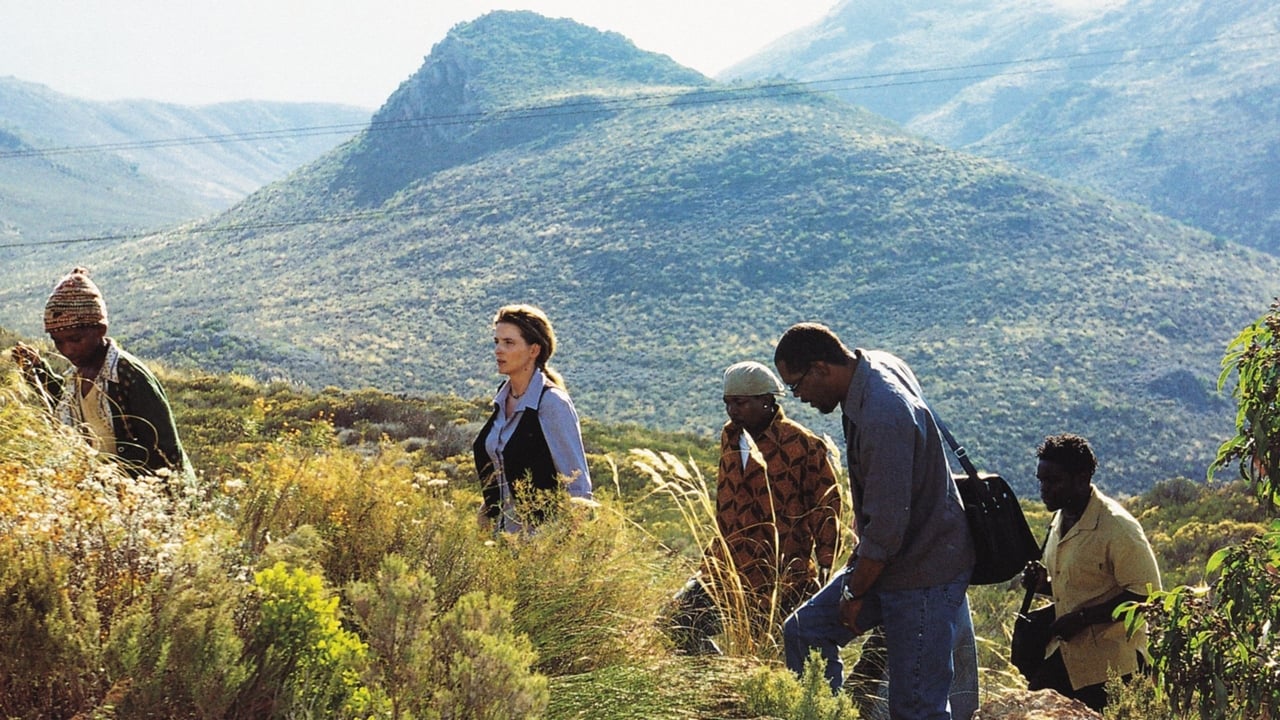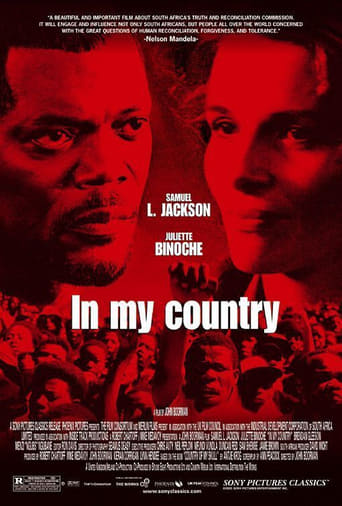

It isn't all that great, actually. Really cheesy and very predicable of how certain scenes are gonna turn play out. However, I guess that's the charm of it all, because I would consider this one of my guilty pleasures.
... View MoreI am only giving this movie a 1 for the great cast, though I can't imagine what any of them were thinking. This movie was horrible
... View MoreYour blood may run cold, but you now find yourself pinioned to the story.
... View MoreIt is interesting even when nothing much happens, which is for most of its 3-hour running time. Read full review
... View MoreI give it an 8 purely on the basis of the performance by Brendan Gleeson as the Afrikaans Police Head De Jager. I disagree with what someone below has said - this is not a caricature - it is an extraordinarily dense and layered performance by possibly the best character actor going around today.We are confronted by what has happened and the question is a blinding "HOW?", but it is the interview with De Jager interspersed that somehow underpins the entire film. We see this deeply deeply flawed human being, at one time arrogant and afraid - in fact I don;t have the words to describe the complexity and humanity of this performance... but I came out of it understanding how such crimes were perpetrated by a 'human being' and certainly not,as so often is the case, a one dimensional vaudeville villain.Extraordinary performance .. although I have to agree that some of the early dialogue is clunky and seems to just be giving us background.. but the film does find its voice as it goes on. James
... View MoreJohn Boorman, an interesting film maker, takes us to South Africa after Apartheid. Right after the country underwent the big change during the last decade of the last century, a commission was formed in order to hear the atrocities that were committed by the old regime, as the victims, and their families, were invited to come forward and speak to the panel that was investigating. The film is based on a novel by Antjie Krog, but not having read it, one can't really give an opinion about how true the film is to the novel."In my Country", the movie based on this book in its American release, came and went quickly. We tried to see it during its debut, bu it disappeared from local screens in no time. We recently caught the movie on cable.There are some interesting aspects of what the commission was trying to accomplish in trying to bring members of the repressive force to justice. As in other conflicts, the people that were involved in the atrocities keep repeating about how they were following orders, a poor excuse, since no one owned up to having done anything wrong. After all, this was a country in which a white minority controlled a big black majority, and who wanted to keep things unchanged.At the center of the story is Anna Malan, a white South African, who is a radio personality. She follows the commission as more and more people are coming forward to tell their stories. A Washington Post black reporter, Langston Whitfield, is also covering the process. Inevitably, both come together. While they clash at first, they find common ground in their desire to tell the truth about South Africa.Juliette Binoche and Samuel L. Jackson are seen as Anna and Langston. Both give good performances. Brendan Gleeson is seen as the evil De Jager, a man responsible for some of the crimes committed against the poor black of the country who were deemed terrorist by the controlling whites. Menzi Ngubone plays Dumi, Anna's assistant and Sam Ngakone makes a dignified appearance as Anderson, who works for Anna's family.The film is interesting to watch as Mr. Boorman has given us a film to think about the criminal acts that were committed by a group of people that didn't stop to consider the consequences of what they were doing.
... View MoreWelcome to the New South Africa. The old order has fallen and the in-coming majority has decided to deal with the excesses of the old order genteelly through a Truth and Reconciliation Commission. Anna Malan (Juliette Binoche) is one of the widely respected local reporters covering proceedings. And Anna is quite intent on celebrating South Africa's newly found freedom even though most other Afrikaaners either ignore the change-over or show polite disdain for Anna's exuberance. Anna is a bit too enthusiastic to take notice of the subtle expressions of displeasure.The scenes with Anna and her Afrikaneer family and friends are magnificently staged, capturing the tension of the moment and Anna's blithe ignorance of the discomfort of all around her.Anna is joined at the reporter's table by the American Langston Whitfield (Samuel L. Jackson) who finds great affection Afrikaaners and Africans have to their country very different from his ambivalent feelings toward his own. Yet while Whitfield is up to some serious work running a story on the notorious Colonel De Jager (Brendan Gleeson), does join the celebration.The excesses that the high priests of the old order have to publicly own up to range from the brutal and macabre to the plain bizarre. "I have only one question," an old man asks, "before I forgive you. Why did you chop down my fruit trees?" Most incidents are far more serious. Certainly the propensity of the unlawful violence and brutality was on a scale Bush and Cheney could only envy.The Commission, though it is exhuming bodies across the velt, cannot get a true grip on the organized violence of the former regime. Enter Colone De Jager. Though the Colonel reveals the secret torture camp, he is denied amnesty for having gone too far."Why," cries Anna after DeJager as he is being carted away, "did you do this?" The answer is as bizarre as the violence itself.The movie is highly recommended though the end is probably a little too arty for an American audience.
... View MoreIn conventional film making, producers think that political problems always have to be shown through a story. Mostly some kind of love story. The individual is always much more important than the masses, according to that liberal ideology.That's the problem with "Country on my Skull". The testimonies from the victims of apartheid come second to the story between the Africaan woman and the Afro-American man. That's violating what ought to be the main issue here.Samuel L Jackson and Juliette Binoche are both good, but their story is somewhat indescent and also typical for this kind of conventional film-making.
... View More